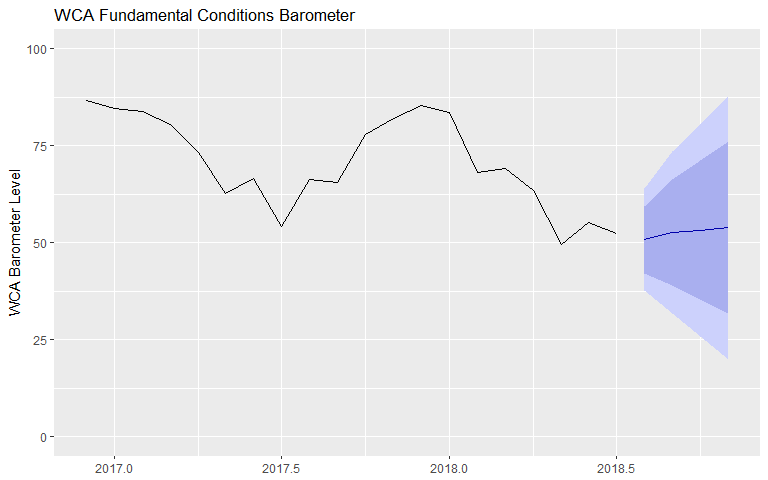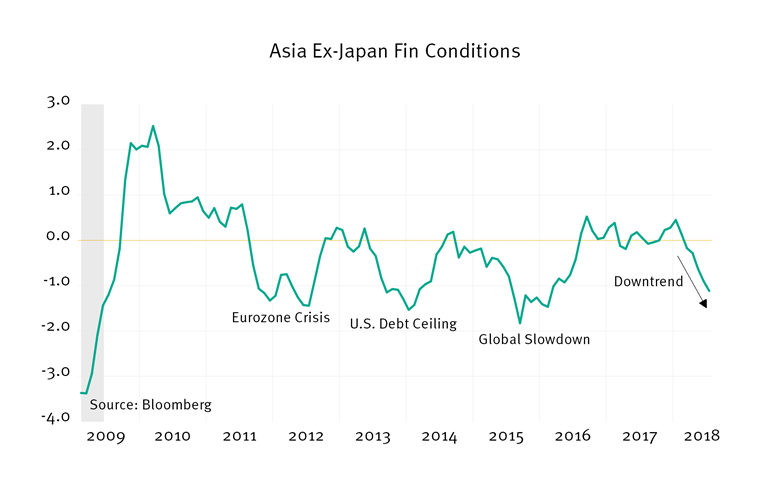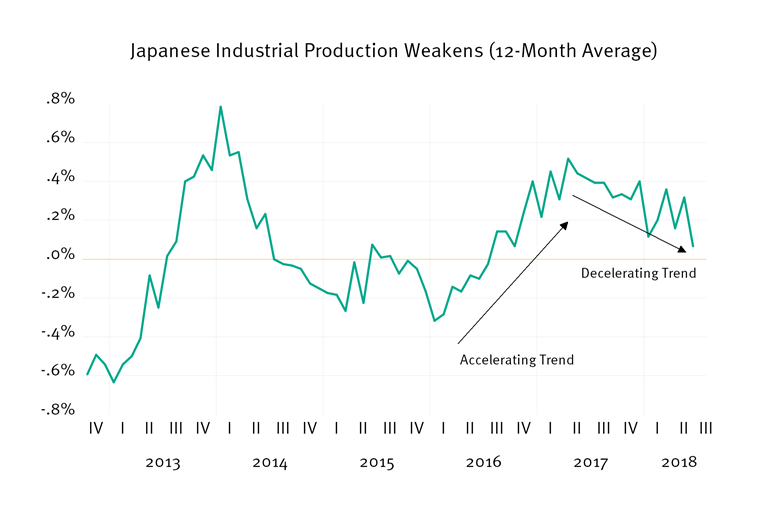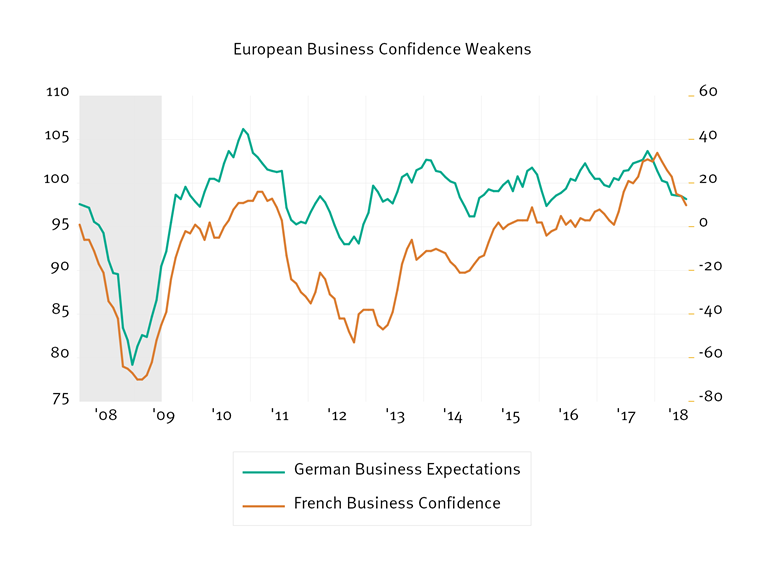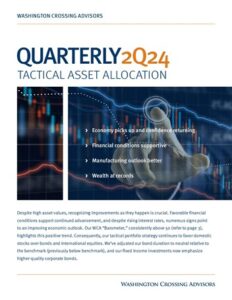Monday Morning Minute 082018
WASHINGTON CROSSING ADVISORS
THE WEEK AHEAD
Against a good global backdrop, Turkey reminds us that risk still exists.
So Far… So Good…
Our WCA Fundamental Conditions Barometer remained stable over the past month (chart A, below). This is a good sign for the economy and markets. Because performance has firmed up, we have stopped cutting equity exposure, and remain tactically tilted toward stocks in Conquest tactical ETF portfolios.
If we drill deeper into the barometer, we can get a better understanding of what is going on. The barometer has about one-third weighting in market based indicators of “risk appetite”, one-third on U.S. economic data, and one-third on foreign data. Between April and July, markets performed well in a sign that investors felt good about the future. Trade worries were not enough to overcome positive news about corporate earnings or jobs. After all, S&P 500 company’s profits are up 23% from a year ago, and the unemployment rate (now 3.9%) should soon hit levels not seen since the 1960s.
What About Overseas?
While trends in the United States look relatively healthy, there are a few signs of stress globally. Here are a few examples of what we are seeing. China’s currency has tumbled 10% in value versus the U.S. dollar in just three months. Asian financial conditions are becoming less accommodative, based on a Bloomberg index (Chart B, below) that measures such conditions. Japan’s rate of industrial production growth has been trending lower for several months. Lastly, business leaders in Europe appear to be reducing their level of expectations for business conditions in the months ahead.
As you can see, whatever weakness we see within our WCA Fundamental Conditions Barometer seems to be focused on places outside the United States. This supports our relatively bullish outlook on domestic assets versus foreign assets in Conquest portfolios. Because the most acute stresses seem, for the moment, to be concentrated among rapidly growing emerging markets, we continue to focus on developed markets versus emerging on a tactical basis.
Chart B
Chart C
Chart D
TACTICAL CALLS
Tactical Satellite (Based on 3-6 Month Outlook)
- Overweight Stocks vs. Bonds
Kevin Caron, CFA, Senior Portfolio Manager
Chad Morganlander, Senior Portfolio Manager
Matthew Battipaglia, Portfolio Manager
Suzanne Ashley, Analyst
(973) 549-4168
www.washingtoncrossingadvisors.com
____________________________________________________________________________________________________________________________________
Disclosures
WCA Fundamental Conditions Barometer Description: We regularly assess changes in fundamental conditions to help guide near-term asset allocation decisions. The analysis incorporates approximately 30 forward-looking indicators in categories ranging from Credit and Capital Markets to U.S. Economic Conditions and Foreign Conditions. From each category of data, we create three diffusion-style sub-indices that measure the trends in the underlying data. Sustained improvement that is spread across a wide variety of observations will produce index readings above 50 (potentially favoring stocks), while readings below 50 would indicate potential deterioration (potentially favoring bonds). The WCA Fundamental Conditions Index combines the three underlying categories into a single summary measure. This measure can be thought of as a “barometer” for changes in fundamental conditions.
The information contained herein has been prepared from sources believed to be reliable but is not guaranteed by us and is not a complete summary or statement of all available data, nor is it considered an offer to buy or sell any securities referred to herein. Opinions expressed are subject to change without notice and do not take into account the particular investment objectives, financial situation, or needs of individual investors. There is no guarantee that the figures or opinions forecasted in this report will be realized or achieved. Employees of Stifel, Nicolaus & Company, Incorporated or its affiliates may, at times, release written or oral commentary, technical analysis, or trading strategies that differ from the opinions expressed within. Past performance is no guarantee of future results. Indices are unmanaged, and you cannot invest directly in an index.
Asset allocation and diversification do not ensure a profit and may not protect against loss. There are special considerations associated with international investing, including the risk of currency fluctuations and political and economic events. Investing in emerging markets may involve greater risk and volatility than investing in more developed countries. Due to their narrow focus, sector-based investments typically exhibit greater volatility. Small company stocks are typically more volatile and carry additional risks, since smaller companies generally are not as well established as larger companies. Property values can fall due to environmental, economic, or other reasons, and changes in interest rates can negatively impact the performance of real estate companies. When investing in bonds, it is important to note that as interest rates rise, bond prices will fall. High-yield bonds have greater credit risk than higher-quality bonds. The risk of loss in trading commodities and futures can be substantial. You should therefore carefully consider whether such trading is suitable for you in light of your financial condition. The high degree of leverage that is often obtainable in commodity trading can work against you as well as for you. The use of leverage can lead to large losses as well as gains.
All investments involve risk, including loss of principal, and there is no guarantee that investment objectives will be met. It is important to review your investment objectives, risk tolerance and liquidity needs before choosing an investment style or manager. Equity investments are subject generally to market, market sector, market liquidity, issuer, and investment style risks, among other factors to varying degrees. Fixed Income investments are subject to market, market liquidity, issuer, investment style, interest rate, credit quality, and call risks, among other factors to varying degrees.
This commentary often expresses opinions about the direction of market, investment sector, and other trends. The opinions should not be considered predictions of future results. The information contained in this report is based on sources believed to be reliable, but is not guaranteed and not necessarily complete.
The securities discussed in this material were selected due to recent changes in the strategies. This selection criteria is not based on any measurement of performance of the underlying security.
Washington Crossing Advisors LLC is a wholly owned subsidiary and affiliated SEC Registered Investment Adviser of Stifel Financial Corp (NYSE: SF).
The Standard & Poor’s 500 Index is a capitalization-weighted index that is generally considered representative of the U.S. large capitalization market.
Source: Washington Crossing Advisors

